Review: 'The Ursa Major Awards Anthology', edited by Fred Patten (by dronon)
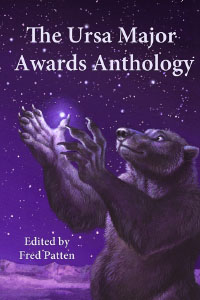 The Ursa Major Awards have been running since 2001, and one of the more difficult categories to vote in has been "Best Anthropomorphic Short Fiction", due to the works being scattered across various fanzines, magazines, con books and web pages. So I'm very glad that Fred Patten has edited together The Ursa Major Awards anthology: a tenth anniversary celebration, published by FurPlanet (2012), allowing us to read eleven stories from across the fandom collected under one cover. (341 p., ISBN 9781614500520)
The Ursa Major Awards have been running since 2001, and one of the more difficult categories to vote in has been "Best Anthropomorphic Short Fiction", due to the works being scattered across various fanzines, magazines, con books and web pages. So I'm very glad that Fred Patten has edited together The Ursa Major Awards anthology: a tenth anniversary celebration, published by FurPlanet (2012), allowing us to read eleven stories from across the fandom collected under one cover. (341 p., ISBN 9781614500520)
See also: Reviews by Roz Gibson and Watts Martin
The original idea was to print the winning short story from each year of the Awards, but because Kyell Gold has won the popular vote consecutively from 2006 to 2011, this felt a little unbalanced towards the other contributors, so only three of his works appear here. (It skips In between from 2008 and Bridges from 2010.)
To pad out the book a little more, three Ursa-nominated stories were also included. Most of the works are about 20-30 pages in length, with occasional illustrations from artists such as Synnabar, John Cooner and Vicki Wyman. The gentle, moonlit cover art was done by Blotch.
Chapters 1-5 are different from chapters 6-11 in that each of the earlier stories are part of longer, ongoing episodic works. Thankfully, Fred introduces everything with a short paragraph or two to provide the necessary context, so readers will have no trouble understanding what's going on. Chapters 6-11, meanwhile, are stand-alone works. There's also a history of how the Ursa Major Awards originated, a list of the short story winners and nominees, and brief author and artist bios.
Before I get to the stories themselves, I should mention that this collection contains occasional mature content (both M/F and M/M), mildly gratuitous but not so overt as to push it into erotica. If you showed it to someone outside the fandom, it might reinforce some of our stereotypes, but frankly they're not the target audience here. These are predominantly stories written from within the fandom, for the fandom, and there's a broad range of story styles.
1. Beneath the Crystal Sea, by Brock Hoagland (2001 winner).
Set in a world similar to that of Conan the Barbarian, this story follows the adventures of Perissa, a determined young leopardess who has yet to carve out a name for herself in her chosen profession - an assassin. Having indulged in silks, jewelry and gambling, she's now short on funds and takes on a commission that's unlikely to have a big pay-off, accompanying a rakish fox nobleman and sea captain in search of a legendary treasure, wary of betrayal. Perissa is a strong character who doesn't suffer fools lightly, and the author also doesn't miss an opportunity to inject a little cheesecake when he can. But what the hey, it's a Conan-esque sword-and-sorcery adventure, it comes with the territory, and Hoagland follows the formula. All it's missing is a Boris Vallejo painting, but Vicky Wyman's artwork serves it just as well.
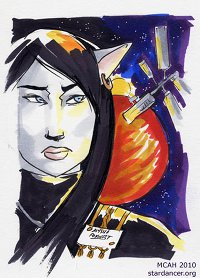
2. Familiars, by Michael H. Payne (2002 winner).
The shortest story in this anthology, only 8 pages long. Taking place at a college for magic-users, Cluny is a squirrel familiar assigned to a young wizard, only she's much more proficient at spell-casting than he is. And when Cluny tries to help him with a spell, something goes very wrong indeed. This tale is short, amusing, and simply screams for additional content. It feels more like a book excerpt than a short story. Fred mentions this is the first of five stories with Cluny so far; I hope the others are available somewhere! [Ed.: Payne provides a complete list; a sixth is coming.]
3. In the line of duty, by M.C.A. Hogarth (2003 winner).
This is but one of Hogarth's science-fiction stories featuring Alysha Forrest, and it works fine on its own. Alysha is a feline humanoid in the 25th century who works on a mixed-species starship. In this story, the ship answers a distress call and discovers a freighter vessel trapped in the gravity well of a gas giant, with only a limited window of opportunity to save those on board... and then things get complicated, requiring some very difficult choices to fully save the cargo and crew. A good, short work that brings across the tension of the situation.
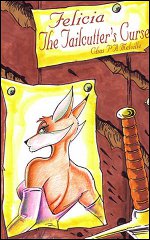
4. Felicia and the Tailcutter's curse, by Charles P.A. Melville (2004 winner).
The longest story in the book, at 76 pages. Chuck Melville has been writing and drawing a series of fantasy stories for years, infused with a cartoony sense of humor. Felicia is one of his primary characters, a renegade sorceress who carries herself with a flippant, selfish attitude, but underneath she has a good heart and sympathizes with the downtrodden. She works as a magi-for-hire, although she doesn't want to get caught up in the magical politics of her world while she pursues her own agenda. In this story, she decides to take a vacation, and ends up staying at the castle of a moronic (if well-meaning) nobleman and his surly, sarcastic manservant. Suddenly the visiting dignitaries are being murdered and a magical investigation is in order, made more difficult by rumors of an ancient curse. Although Felicia is at first reluctant to get involved, she applies herself to the problem, despite interfering factors such as the amorous advances of a mouse while she's trying to flirt with the castle gardener. All good fun, brought to a satisfactory conclusion, and illustrated by the author.
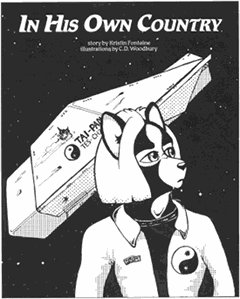
5. In his own country, by Kristin Fontaine (2005 winner).
This is a science-fiction story set in the shared universe of the Tai-Pan Literary & Arts Project, following the adventures of the crew of the Tai-Pan, a shipping and trading starship. Although it has a large cast of characters, this story focuses on Aubrey, a skunk in its security personnel, suddenly thrust into being chief security officer in the wake of a ship-wide crisis. Betrayed by one of their own, the Tai-Pan is recovering from an attack by pirates. Several members of the crew are now dead or critically injured, and it's unclear if they'll manage to reach a port in time to receive adequate medical attention. The story is one of coping with loss and maintaining ship discipline, made worse by being short-staffed and over-worked as they deal with both the pragmatic and bureaucratic repercussions of the attack - not to mention the emotional trauma. Aubrey in particular is dealing with self-confidence issues due to the sudden increase in responsibilities that the position of security officer requires, without having received high-level training.
Reading this story started off badly for me because I hadn't fully absorbed Fred's introduction. "Aubrey" to me is a female name, and the opening artwork was not very good; he looked like a woman. Being inundated with the names of the crew on the first page, I had no idea to whom the rogue male pronoun was referring. After getting a couple of pages in and then backtracking, I figured out my mistake and was able to read the rest of the story just fine, but this is one of the more complex story universes to absorb for unfamiliar readers. It felt more like a vignette than a short story; still, it gave a realistic presentation of the crisis and the difficulties they were trying to deal with. A character study that showed that for some of the crew, the Tai-Pan is more than a job - it's like a family.
6. Jacks to open (2006 winner),
7. Don't blink (2007 winner),
9. Drifting (2009 winner), by Kyell Gold.
At this point in the book, we reach the stand-alone stories. Kyell's contributions all feature sexual attraction between male characters, but each tale is very different in setting and tone.
Jacks to open takes place in Vegas, in which a wolf has been hired to investigate the reliability of a fox blackjack dealer at a casino. Despite his employer's instructions, the wolf finds himself attracted to the fox. Throw in a tinge of Vegas' seedy underbelly, along with attempts to read the future using a special deck of cards, and it's an interesting little adventure.
Don't blink was an exercise in contrast for me, because it's a superhero story that made me think back to D.J. Fahl's book, Save the Day, that I reviewed here three months ago. Don't blink is the story of Jake, aka Blink Coyote, who has the power of teleportation and is the newest member of the League of Crimefighting Canids. Young, eager and optimistic if a little immature, Jake is still learning to control his powers (with the help of his girlfriend). But he finds out very quickly that it's time to smarten up, especially when he realizes that he's not only bisexual - he's also got a nemesis. Like Save the Day, the control of secrets forms part of the plot, and there's a light, silly humor to it as it has fun with the superhero premise.
Drifting is the most reflective of Kyell's stories in this collection, this one focusing on interpersonal dynamics. Tobias has been living with his boyfriend Dylan for several years, but the spark between them has inexplicably died, and Tobias' confidence is suffering badly, made more difficult by not having any close friends in the city. Working out at the gym, he meets Marty, who tries to cheer him up while giving support and advice, but isn't interested in a long-term relationship. Eventually Tobias confronts Dylan, and there's a huge hole in the plot: Dylan's inner problems are left completely unexplained (in fact, the topic is outright avoided), but in a way this increases the nebulousness of the piece. Drifting is an entirely appropriate title, referring to that unsure state when you have no anchor, no direction, and no idea if things are going to work out.
8. Six, by Samuel C. Conway (2002 nominee).
These last three stories in this review are the ones that were nominated for Ursa Awards. The first, Six, is written by our well-known chair of Anthrocon, but is more serious than the stories he usually tells on stage. It's difficult to say much about this short piece without spoiling it. It starts with the premise, "What would you do if you met an anthropomorphic animal in real life?" Except instead of it being an escapist fantasy - What if it was an inexplicable, unique creature, possibly dangerous? Would you hide it? Turn it in? That's the sort of thing the protagonist in Six has to deal with.
10. Ailoura, by Paul Di Filippo (2002 nominee).
This story was new to me, and my favorite of the bunch. Well, some of its wording was a bit flowery (I sensed a thesaurus at work), but plot-wise, it's a very entertaining science-fiction adaptation of Puss in Boots. Geisen, the youngest of three brothers, has been cheated out of his inheritance, lost his fiancée, and narrowly avoided being framed for the death of his father. Left with almost nothing, he sets out with his aging anthro-feline servant to recoup his fortunes from his family by whatever means necessary. Throw in a dubious business colleague and a half-mad home computer AI, and you've got a fun little tale of trickery and come-uppance.
11. St. Ailbe's Hall, by Naomi Kritzer (2004 nominee).
I was very happy to see this show up in print, and also glad because it's an excellent story to end this collection with. (I voted for it in the 2004 Awards, but it didn't win.) It's an idea that's been explored before (for example, in Article of Faith by Mike Resnick), this time with a furry spin: If we create self-aware creatures, do they have a soul, and do they have the same religious rights as the rest of us? St. Ailbe's Hall is the story of Father Andrew, who encounters a young activist who brings her enhanced, sentient dog to church. The priest is sympathetic to her desire to make a statement about social rights, but the situation quickly spirals beyond their control, faced with increasingly angry and closed-minded parishioners, and little guidance from his religious superiors. Can he reconcile his faith with his conscience?
Overall, this was a good collection of stories from across the fandom, showing a lot of diversity. Some happy, some introspective, some science-fiction, some fantasy - a little something for everyone. Thanks, Fred, for putting it together!
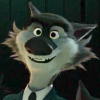
Comments
Okay, this is weird...
I purchased a copy of The Ursa Major Award Anthology at Anthrocon and have been picking it up now and then to read one of the stories. I currently have five stories to go (four if you don't count the one I read back at the time it was released).
And here's the weird part. My copy of the anthology includes one additional story that is not mentioned in this review, nor is it mentioned in the reviews posted here by Roz Gibson and Watts Martin. The story is Niner-Thirteen by Jim Hayden, which was a 2001 nominee. In my copy it's the seventh story, between Jacks to Open and Don't Blink, and the other eleven stories mentioned in the reviews are all present. So now I'm left wondering how it is that my copy has an extra story that not just one but all three of the Flayrah reviewers didn't mention? Did it perhaps appear only in the print edition and the reviewers all worked from the Kindle edition?
That is very strange. That story is not listed in ToC of the scanned copy that Amazon displays (there is no Kindle version that I'm aware of). Is he in the ToC of your version?
Perhaps you got a proof version and the story was withdrawn from later printings for some reason - or perhaps the reverse is true, and they only received permission after proofs were printed and sent out for review.
I was wondering how long it would take for somebody to notice that the copies of The Ursa Major Awards Anthology sold at Anthrocon 2012 had twelve stories, but the copies sold since then have only eleven stories. Anthrocon began June 14 and it's now November 2 -- not quite five months.
When FurPlanet and I started to put together The Ursa Major Awards Anthology, there were thirteen stories that I wanted to include, if the book could fit that many into it. The eleven that are in it now which included all of the Ursa Major winners except the two by Kyell Gold that we had decided were too much Kyell Gold; and five finalists -- the three included in the book, "The Good Sport" by Bill Kieffer from The Metamor Keep website in 2001, and "Niner-Thirteen" by Jim Hayden from Yarf! #61 in 2001. Teiran at FurPlanet said okay.
The first failure was of "The Good Sport". Bill Kieffer had disappeared since 2001, and nobody could find him to get his reprint permission. Chris O'Kane, the Metamor Keep webmaster, was apologetic, but the story was copyrighted by Kieffer and we would have to get his permission. We could not find him by press time, so we regretfully dropped the story. (You can read it on the Metamor Keep website. A couple of months after The Ursa Major Awards Anthology was published, O'Kane found Kieffer's current address and put us in touch with him. We have his permission to include "The Good Sport" in the next anthology that we publish.)
Jim Hayden originally said "yes" to including "Niner-Thirteen", and we announced The Ursa Major Awards Anthology as containing twelve stories. Jim signed the contract for the book, Teiran sent in the order to have 40 copies printed for sale at Anthrocon, and just about a week before Anthrocon we got an e-mail from Jim. He had talked with a lawyer, who warned him that he could get fired from his job as a schoolteacher if he allowed one of his stories to be reprinted in a "mature" anthology. It seemed that Jim was nearing retirement age, and his school was firing its retiring teachers using any excuse to avoid having to pay retirement pensions. We pointed out that if he was fired for such a reason, he would have excellent grounds for a wrongful termination of employment lawsuit; but Jim said that he would rather not be fired in the first place.
Teiren and I felt that, even if we had Jim's signed contract, we did not want to be responsible, and become known, for deliberately getting him fired. The problem was the 40 copies of the book with the story in it. There was not time before Anthrocon to have the book reprinted without the story. FurPlanet had advertised the book as premiering at Anthrocon; it would have a lot of questions to answer if it missed Anthrocon. Also, the 40 copies had already been printed and FurPlanet's printer would have to be paid. Jim agreed to allow the copies with "Niner-Thirteen" to be sold at Anthrocon if all the copies of the anthology printed after the con had it removed. So those attendees of the Anthrocon who bought one of those 40 copies have a "rare collectible". The review copies sent out of the anthology were of the second printing, without the story.
"Niner-Thirteen" is the first story in a series of futuristic anthro-crewed military spaceship adventures. Yarf! published the first three of them and the first half of the fourth story in its final issue. Hayden has at least three more unpublished. They deserve reading, and I hope that he is able to have them published somewhere -- maybe after he retires.
Fred Patten
Post new comment